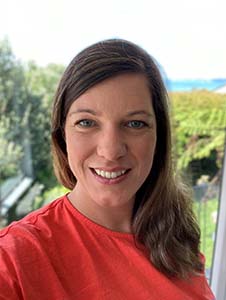
Nina Ufferhardt
Nina Ufferhardt is not one to sit idly by. With great enthusiasm, she has carved out a career in the broad field of dental technology that makes the most of her skills and interests.
She graduates with Distinction in a Postgraduate Diploma in Clinical Dental Technology on 11 December.
As soon as Nina shared news of her enrolment in this postgraduate diploma on social media, an industry contact offered her a job as a senior dental technician in a role that would expand when she completed her studies, that she accepted.
Nina is now working for two companies, both in Lower Hutt just north of Wellington. One is Denture Care Services (DCS), a denture clinic with dental lab, and the other is Additive Manufacturing Solutions (AMS). These roles complement each other and make the most of Nina's talents.
“I loved combining teaching with research. We were looking at fracture mechanics and stresses within implant overdentures as well as the creation of a model that would allow to recreate fracture pattern of bone fractures. It combined anatomy and my engineering background. I like the clarity of physics and fractures - you have a hypothesis and often a good idea of where it might be headed to. I make things, I break things, I write them down. Done.”
She says her work is a real mixture of things she loves, engineering and problem solving, applying the technical knowledge acquired at Uni and working with her hands, and academic research through the exploration of digital design and printing in the dental field.
“It's an exciting time with so many new possibilities as dental technology goes digital. We are not just 3D printing in plastic but also in metal, mainly, but not limited to dental frames. Those machines can do more, and we are looking at opportunities for how we can expand this,” Nina says.
AMS is linked to Callaghan Innovation in Lower Hutt, a Crown entity that is tasked with making NZ business more innovative and grow faster.
“I must give a lot of credit to my boss Craig Metcalfe at DCS, who works together with his brother Stephen at AMS. He is a maverick - no matter how crazy the idea sounds to others, he will say 'let's see what we can make out of this idea'. He is a real doer and allows us to get involved as much as we can,” Nina says.
“This beauty of this company is also that it's not limited to dental, my boss also has experience with maxillofacial (jaws and face) prosthesis. We contract for the local hospital and work on cases which can be quite different to what we get in the denture clinic. For example, cleft palate orthodontic appliances for babies or appliances for cases with a hole in their palate that potentially prevents them from eating or speaking.
“This is what I find most exciting in my work right now - I love working with patients and find it really rewarding. And now with my postgraduate qualification I can get my Dental Council certification to treat patients, which I am really excited about.”
In her native Germany, Nina did an apprenticeship as a dental technician then an engineering degree specifically focused on dental materials. Part of this degree was a research thesis, which brought Nina to New Zealand on an exchange programme with the Dental Faculty at Otago.
After graduating Nina immediately started a job with Ivoclar Vivadent in Liechtenstein, travelling the world: “It was exciting and it was a full on, 40 hours a week didn't cut it.”
On a holiday back to New Zealand with her now husband, Maik Ufferhardt, Nina called in to say hello to old friends at the Otago Faculty of Dentistry, who encouraged her to apply for a position that had just come up.
“I loved combining teaching with research. We were looking at fracture mechanics and stresses within implant overdentures as well as the creation of a model that would allow to recreate fracture pattern of bone fractures. It combined anatomy and my engineering background. I like the clarity of physics and fractures - you have a hypothesis and often a good idea of where it might be headed to. I make things, I break things, I write them down. Done.”
The arrival of twins saw Nina relocate to Wellington to live with her husband. Nina took some time to focus on her young family.
Then a friend suggested a 'bench-test' in a dental laboratory to see how it felt being back, “I loved working in the lab again and using my hands,” Nina says. She reactivated her dormant registration and started contracting with flexible work hours for about four years before adding postgraduate study with Otago into the mix.
She completed the one-year course part-time over two years, travelling to Dunedin twice a year for two-week block courses. This travel was touch-and-go with the constant threat of disruption from COVID-19 and it was a busy time with family and work commitments as well but everything managed to come together.
The course is for dental technicians to obtain training in Clinical Dental Technology and enables graduates to practise limited non-invasive clinical procedures safely and restore the dentition using removable full or partial dentures. It involves clinical practice as well as formal education and teaching. Nina loved her studies, “even though it was challenging at times, the encouragement from the tutors to push past the lows saw us through.”